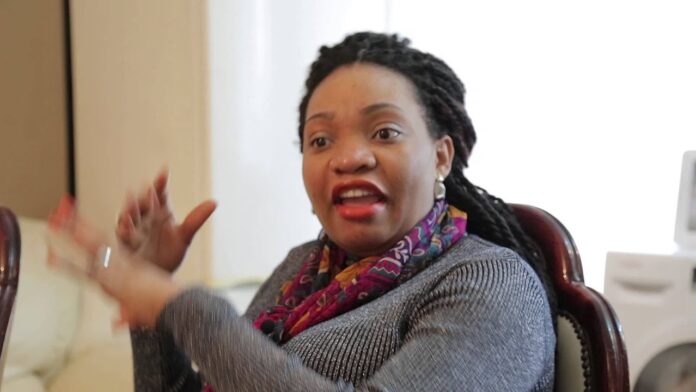Uchechi Okwu-Kanu, wife of Nnamdi Kanu—the convicted leader of the proscribed Indigenous People of Biafra (IPOB)—has strongly criticised the judgment delivered by the Federal High Court in Abuja on Thursday, describing the process as a “travesty of justice” and accusing the presiding judge, Justice James Omotosho, of failing to follow constitutional procedures.
On Thursday, Justice Omotosho sentenced Nnamdi Kanu to life imprisonment after finding him guilty on all seven terrorism-related charges brought by the Department of State Services (DSS). The court ruled that the prosecution had presented “sufficient and credible evidence” and noted that Kanu’s decision not to enter a defence left the court with no option but to convict him.
But shortly after the ruling, Uchechi Kanu released a strongly worded reaction, saying the judgment was not only faulty but unconstitutional. She claimed the judge did not properly read out the law under which her husband was being tried, and further alleged that he appeared to struggle while reading the written judgment.
According to her, “In Nigeria, a judge cannot ask a defendant to open a defence on terrorism-related charges without reading out the written law under which the court is trying that person. Section 36 of the 1999 Constitution is very clear. A person cannot be convicted of a criminal offence unless that offence and its penalty are stated in a written law.”
Uchechi alleged that the judge merely read “a script handed over to him,” insisting that many people in the courtroom noticed the difficulty he supposedly had reading his own judgment.
Nnamdi Kanu, founder of IPOB, has faced multiple charges since 2015, including allegations of treasonable felony and terrorism. IPOB was declared a terrorist organisation by the Nigerian government in 2017, a move the group has consistently rejected.
Kanu, who fled Nigeria in 2017 while on bail, was rearrested in 2021 and has been in DSS custody since then. His trial has drawn national and international attention, sparking debates on human rights, national security, and the handling of separatist movements in Nigeria.
Thursday’s ruling was considered a major turning point, as the court found him guilty on all counts, leading to widespread reactions from supporters, legal experts, and political observers.
In her criticism, Uchechi Kanu argued that her husband was forced to face charges under a “repealed law,” which she said violated constitutional safeguards.
“He forced Mazi Nnamdi Kanu to take a plea under a repealed law, which Mazi Nnamdi Kanu refused. He asked: ‘Show me where it is written before I can enter a defence.’ And that never happened,” she stated.
Uchechi also accused Justice Omotosho of refusing to give written rulings on several key applications filed by the defence team, claiming that this denied Kanu the chance to properly challenge parts of the prosecution’s case.
“Omotosho refused, blatantly and flagrantly, to issue written rulings on serious applications. He told Mazi Nnamdi Kanu to put all objections in a final address, then blocked the final address. So if you were Mazi Nnamdi Kanu, you would be as outraged as he was this afternoon,” she said.
She said Kanu was denied his right to submit a written final address, which is a standard part of criminal trials and allows both parties to summarise their arguments before judgment.
“You cannot ask me to put my final address down, write it down, and then block it. It is his right to put a final address down. But Omotosho blocked that and decided to read out those nonsense he called counts,” she claimed.
The life sentence handed down to Kanu is expected to generate more debate in the coming days. Legal analysts say the defence team may appeal the ruling, especially given Uchechi Kanu’s claims of constitutional violations. Human rights organisations and international observers who have followed the case closely are also expected to release statements.
The judgment comes at a time when tensions remain high in parts of the South-East, where IPOB continues to command support despite being banned. Security agencies have repeatedly linked violent attacks in the region to IPOB factions, though the group often denies involvement.
For many Nigerians, the conviction raises broader questions about the government’s handling of separatist movements, freedom of expression, and the balance between national security and civil liberties.
With the life sentence now delivered, Kanu’s legal team is expected to announce its next steps. Under Nigerian law, he has the right to appeal the conviction and sentence. Whether or not the appeal proceeds, the ruling will remain one of the most significant in Nigeria’s recent legal history.
For now, the reactions especially from his wife suggest that the road ahead will be long and filled with further legal battles.
Uchechi ended her statement by insisting that justice was denied: “I’ve had to quickly post about the travesty of justice today. What happened in that courtroom ignored the Constitution. It ignored fairness. It ignored the law.”

